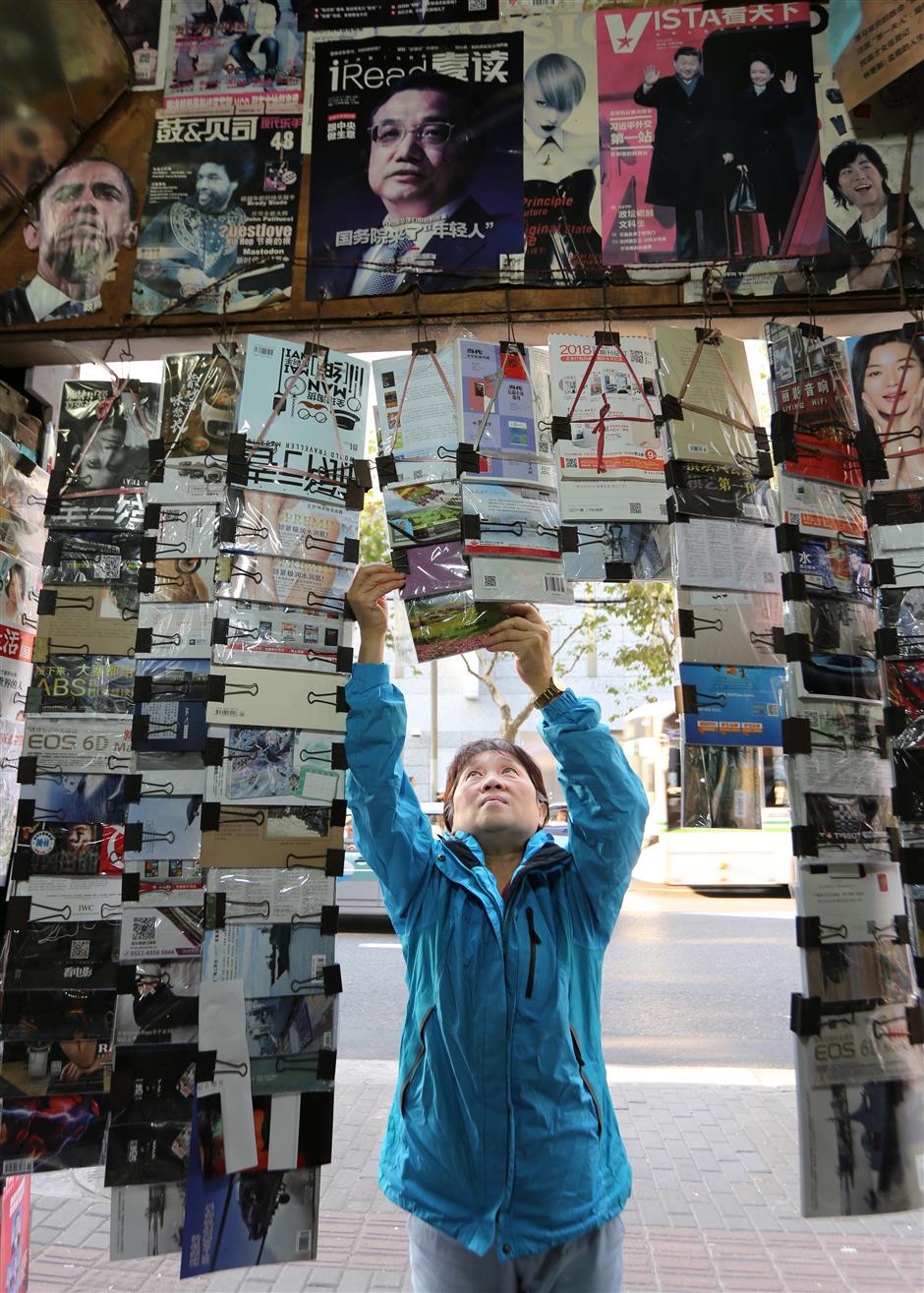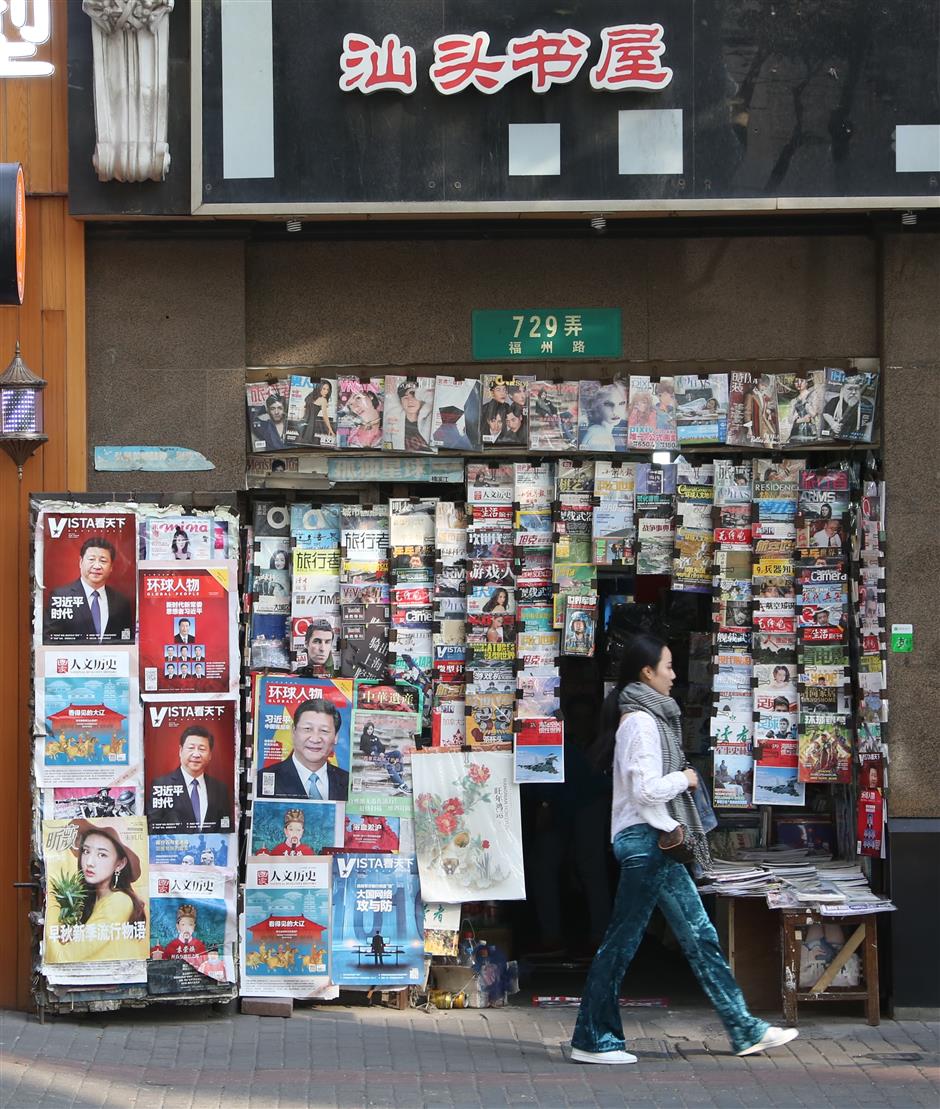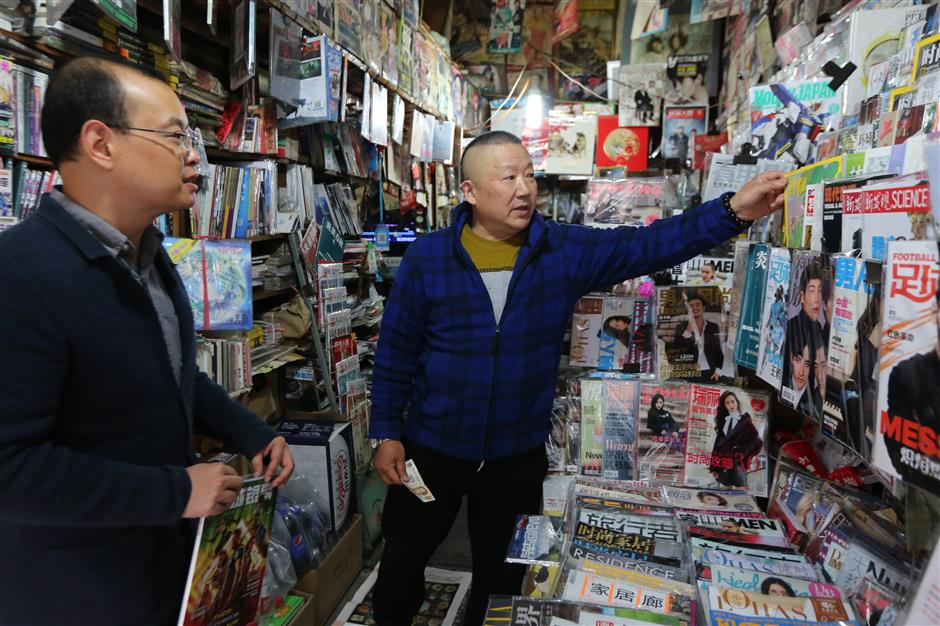Fewer readers bollix bookshop
In an era when commerce and leisure time are defined by online activities, a small bookshop in downtown Shanghai’s Huangpu District stands out as a bit of an anomaly.
The Shantou Bookstore on Fuzhou Road, owned by Zhao Yan and her husband, has been open for more than three decades and now sells mostly magazines.
“Business is hard nowadays,” says Zhao. “Sales are less than 10 percent of our peak years. But we won’t shut the store as long as we still have patrons that support us.”
Indeed, the 20-square-meter shop remains popular with many locals, who cherish it as a neighborhood icon. Passers-by frequently stop to look at the magazines displayed on the front of the store.
Zhao says her interest in books and periodicals dates back to the 1970s, when she was denied entry into a good school and barred from a decent job because her grandfather Peng Shiliang was a Kuomintang general who died in China’s War of Resistance Against Japanese Aggression (1931-45).
Nowadays, Peng is regarded as a hero, but during the “cultural revolution” (1966-76), the family was labeled “counterrevolutionary,” a tag that closed doors of opportunity for the whole family.
Because of those hard times, Zhao says she didn’t know what to do with her life. She watched as many people around her opened up fruit stalls or small grocery stores, and the idea of opening a small bookstore came to mind.
“Reading has always been my favorite pastime,” she says. “I thought it would be good to do something related to my interest.”
At the beginning, the bookstore was located on Shantou Road, from whence it got its name. As business grew, Zhao opened up a branch near the entertainment arcade Great World. Two decades later, the old community on Shantou Road was demolished, and the bookstore moved to its current location.

Zhao Yan arranges magazines at her small Shantou Bookstore on Fuzhou Road.
Zhao’s husband, nicknamed Shantou Wang, did interior decoration for hotels until around 2000, and then he quit his job to join his wife in the business. They don’t have any specific division of labor in the shop but rub along effortlessly.
“If you mention his real name, no one knows whom you’re talking about,” says Zhao. “But if you say, Shantou Wang, people know him at once.”
Now nearly all magazines on the market can be found in the shop, including traditional literary periodicals, news magazines, specialized periodicals and video game introduction magazines. The shop also sells comic books, art books, animations and video games, and sometimes light novels.
But no newspapers can be found here. Zhao says they once tried to sell newspapers, but they just didn’t sell well, for reasons unknown.
“We tried to sell the Xinmin Evening News once,” she says. “We were confident about it because it was the bestseller in Shanghai. But not for us. I still don’t know why.”
Perhaps, she speculated, customers just didn’t equate newspapers with a bookstore.
Over time, the shop has developed a core of loyal, regular customers. Most are middle-aged and elderly people with particular interests like stamp collecting, radios or watches, who come to buy specialized magazines.
“One of our oldest patrons is a man in his 80s,” says Zhao. “He lives in Suzhou, and comes here only once a year, all by himself. Each time, he buys a magazine on watches.”
Friendships between the owners and patrons were inevitable.
Zhao says when she and Wang took a trip to Sichuan Province with his father earlier this year, they left the shop in the care of her sister. When they returned, one customer expressed the fear that the shop was going to close.
“He said he came in every day to see if we were back and started to get worried,” Zhao says. “He thought we had finally decided to throw in the towel.”

Zhao Yan and her husband, "Shantou Wang"

Zhao says she enjoys seeing patrons who have come to the shop since childhood. She watches them grow up, from elementary school to high school, from college into the workplace, from single status to marriage.”
“I used to have a regular who loved to buy magazines on computer science and video games,” she recalls. “But after he graduated, he stopped coming. One day, he finally reappeared and said he just didn’t have spare money to spend on magazines because he was saving up to get married and take out a mortgage.”
Another regular once came to the shop with his bride. When he wanted to buy a movie magazine, the wife scolded him for “wasting money,” and they left without buying anything.
“That made me very sad,” says Zhao. “They were holding cups of coffee from an expensive shop but didn’t want to spend money on reading.”
The core of regular patrons isn’t really large enough to sustain the bookstore. Last year, the couple suffered a loss of about 3,000 yuan (US$450).
“Take the popular fashion magazine Rayli for example,” says Zhao. “We used to stock 100 to 200 issues, but now we stock only two or three.”
Pressed by online retailing and changing public tastes, many of the old periodicals sold in the store have also folded.
“For example, the magazine Guitar was loved by music fanciers,” Zhao says. “It was a specialty magazine devoted to the instrument and its playing. But publication ceased several years ago.”
Zhao says the bookstore’s business reached a peak around 2010 and then slowly declined as the digital age redefined consumerism. People, she says, just don’t seem to have much interest in reading anymore.
“If they do read, they do it on tablets or smart phones,” says Zhao. “Look around on the subway and you’ll find people playing games or watching dramas on their phones. When people want to entertain themselves, they don’t seem to turn to reading.”
It’s a trend she laments.
“Reading helps educate and enlighten people,” says Zhao. “And that’s important no matter what era we live in.”

Wang helps a customer make a mobile payment in the shop.

Wang provides recommendation for a client based on his requirement.
















